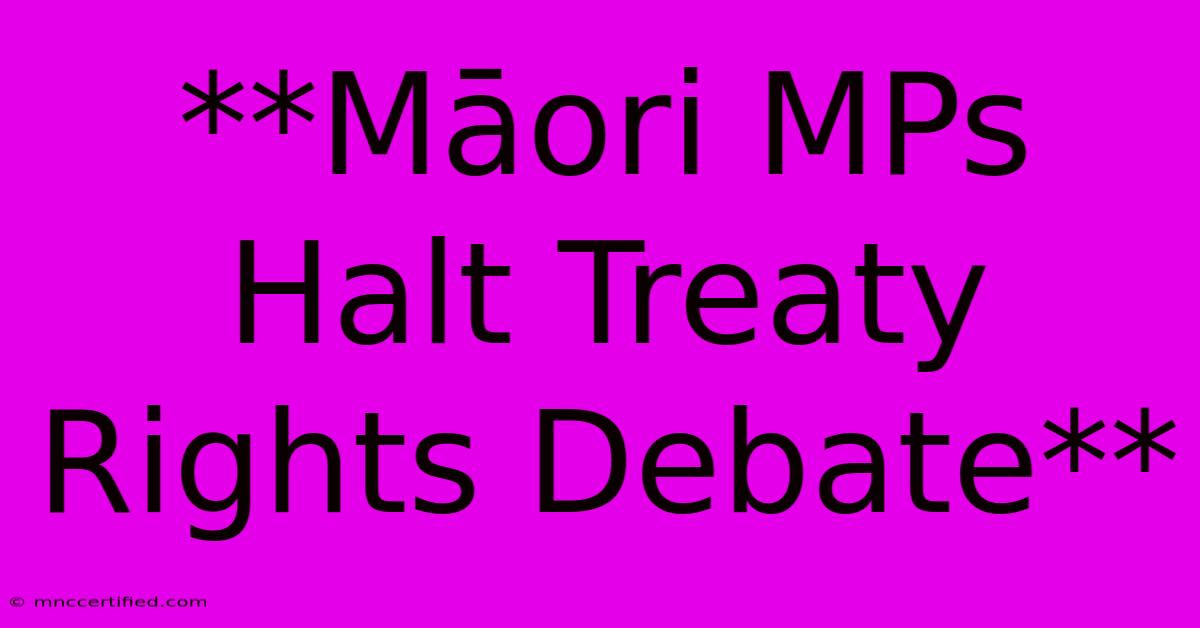**Māori MPs Halt Treaty Rights Debate**

Table of Contents
Māori MPs Halt Treaty Rights Debate: A Deep Dive into the Recent Parliamentary Standoff
The recent halt of the Treaty of Waitangi rights debate by Māori MPs has sent ripples through New Zealand's political landscape. This action, while seemingly disruptive, highlights significant underlying concerns regarding the interpretation and implementation of the Treaty, a foundational document in the nation's history. This article delves into the reasons behind the MPs' decision, exploring the key issues at stake and analyzing the potential consequences of this parliamentary standstill.
Understanding the Context: Treaty of Waitangi and its Modern Implications
The Treaty of Waitangi, signed in 1840, is a complex and often contested document. Different interpretations of its clauses continue to fuel debate about Māori rights and sovereignty. While the Treaty is intended to establish a partnership between the Crown and Māori, its practical application has been a source of ongoing tension and conflict. Many Māori feel the Treaty has been consistently breached, leading to historical injustices and ongoing disparities in areas such as land ownership, resource management, and social well-being.
Key Issues Fueling the Debate
The current parliamentary standstill stems from several intertwined issues, including:
- Resource Management: Disagreements over resource management rights and the Crown's role in protecting Māori interests in natural resources remain a significant point of contention. Māori often argue their customary rights are not adequately recognized and protected under current legislation.
- Land Claims: The process of settling historical land claims continues to be protracted and complex, often leading to frustration and disillusionment among Māori communities. The perceived slow pace of settlements and perceived inadequacy of compensation fuel ongoing resentment.
- Self-Determination: The desire for greater self-determination and control over their affairs remains a central theme for many Māori. This includes greater autonomy in areas such as education, health, and cultural preservation.
- Treaty Interpretation: Fundamental disagreements persist over the correct interpretation of the Treaty itself. Different understandings of the treaty’s clauses significantly influence policy decisions and impact the rights and interests of Māori.
Māori MPs' Actions: A Strategic Move or a Roadblock?
The decision by Māori MPs to halt the debate can be viewed from multiple perspectives. Some see it as a necessary tactic to highlight the seriousness of the issues at stake and to force the government to engage in more meaningful dialogue. Others might view it as a roadblock to progress, hindering the legislative process and potentially delaying crucial reforms.
Analyzing the Strategic Implications
The halt to the debate is undeniably a high-stakes move. It aims to:
- Increase Political Pressure: By disrupting the normal parliamentary process, Māori MPs aim to amplify their concerns and pressure the government to address their grievances more effectively.
- Highlight Systemic Issues: The action serves to underscore the systemic challenges faced by Māori in achieving meaningful redress for past injustices.
- Demand Greater Consultation: The MPs are essentially demanding a more inclusive and participatory approach to Treaty-related legislation, ensuring Māori voices are truly heard and respected.
Potential Consequences and Future Outlook
The implications of this parliamentary standoff are far-reaching. Potential consequences include:
- Delayed Legislation: Crucial legislation relating to Treaty settlements and resource management could be delayed, impacting both Māori and non-Māori interests.
- Increased Political Polarization: The issue could further polarize the political landscape, exacerbating existing tensions between Māori and non-Māori communities.
- Opportunities for Dialogue: Conversely, the standstill could potentially create a space for more constructive dialogue and a renewed commitment to finding solutions that address the core concerns of Māori.
The future outlook remains uncertain. The success of the Māori MPs' actions will depend on the government's response and the willingness of all parties to engage in genuine reconciliation and meaningful dialogue. Finding common ground on issues as deeply rooted as those stemming from the Treaty of Waitangi requires patience, understanding, and a commitment to working towards a truly equitable future for all New Zealanders. The ongoing debate is crucial for New Zealand's future, and its resolution will require a significant commitment from all involved.

Thank you for visiting our website wich cover about **Māori MPs Halt Treaty Rights Debate**. We hope the information provided has been useful to you. Feel free to contact us if you have any questions or need further assistance. See you next time and dont miss to bookmark.
Featured Posts
-
John Lewis Christmas Ad Features Two Sisters
Nov 15, 2024
-
Paraguay Vs Argentina Starting 11 Predictions
Nov 15, 2024
-
Megyn Kellys Snow White Star Comment Sparks Outrage
Nov 15, 2024
-
Snow White Stars Political Views Cause Outrage
Nov 15, 2024
-
Bankruptcy Auction The Onion Buys Infowars
Nov 15, 2024